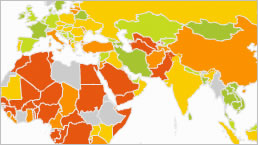G20 Leaders agreed in 2014 on the clear need to enable more women to participate in the global economy. Specifically, the 2014 G20 Leaders’ Communique established the goal of “reducing the gap in participation rates between men and women in our countries by 25 percent by 2025, taking into account national circumstances, to bring more than 100 million women into the labor force, significantly increasing global growth and reducing poverty and inequality.”
Digital financial services are instrumental to achieving this goal, because they increase women’s financial autonomy, support women’s participation in the labor force, and improve the performance of their businesses. Digital financial services also advance the third G20 Principle for Innovative Financial Inclusion, which advocates the use of technological and institutional innovations to expand access to financial services. Principles like this are crucial to boosting economic participation for more than 2 billion people worldwide who currently lack access to formal financial services. Most of whom are women.
This report, endorsed by G20 Leaders in November 2015 in Antalya, outlines the role of digital financial services in improving women’s economic participation, the challenges of increasing women’s access to digital financial services, and the opportunities governments and other sectors have to foster an inclusive global economy in which digital financial services are widely available to everyone, especially women.


